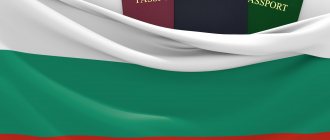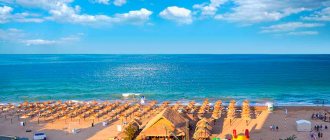Thanks to the common Soviet past, the similarity of mentality and language, Bulgaria is considered one of the most comfortable states for citizens of the Russian Federation (RF) to live in. Favorable climatic conditions and a large number of attractions have turned this country into a popular center of modern tourism. But before you go on vacation or for permanent residence (permanent residence), it doesn’t hurt to find out more about the standard of living in Bulgaria.
What conditions do Bulgarians live in?
The standard of living consists of a set of conditions and indicators that characterize the extent to which people’s basic life (spiritual and material) needs are satisfied. The standard of living is judged on the basis of various factors, including the income of the country's population, the number of unemployed, the size of pensions, the quality of medicine and social security, and the level of development of the education system. Let's look at how ordinary people live in Bulgaria, what benefits and privileges they enjoy.
Wage
The minimum wage is set at the government level. In 2021, this amount was 510 leva /260 euros per month. Thus, the official annual income of a person whose work is paid at this rate is 6,120 leva / 3,130 euros. In 2021, it is planned to increase the minimum wage in Bulgaria to 560 levs / 286 euros per month.
According to the National Statistical Institute of Bulgaria, the average salary in the country before taxes in 2021 ranged from 1,077 levs / 550 euros per month. After taxes were deducted, the employee had about 835 leva/425 euros in hand. In public institutions the salary is on average 1,094 leva / 560 euros, in private companies - about 1,072 leva / 550 euros.
Anyone who lives in Bulgaria and is employed in the field of information technology has the opportunity to receive one of the highest salaries in the country. The monthly income level of an IT industry worker in 2021 was 2,584 leva / 1,321 euros.
Social benefits
On January 1, 2021, the Bulgarian government increased the minimum unemployment benefit to 9 levs per day (instead of 7.2 levs). The maximum payments to unemployed people are 74.29 leva per day. According to representatives of the National Insurance Institute, these amounts will remain unchanged in 2021.
An urgent question is whether there are any benefits and privileges for mothers that make life easier with children in Bulgaria. Thus, at the beginning of 2021, the amount of benefits for raising a small child increased to 380 leva (before this point, the amount of payments was 340 leva). There are no plans to increase this benefit in 2021.
The state also provides a minimum pension to its citizens, the amount of which in the second half of 2021 is 207 leva, and should be increased to 219 leva in 2021.
The government has established additional payments for those pensioners whose benefits are below the subsistence level. Also, war veterans and persons with disabilities receive an additional pension (110 leva).
Health and life expectancy
Treatment in Bulgaria is mostly paid. Citizens of the country are required to make monthly contributions to the National Health Committee. Their size is small - about 10 leva. If a person works, this amount is calculated from wages.
Medicines are dispensed mainly according to a doctor's prescription. Their prices are controlled by the government.
Immigrants who came to the country for permanent residence have the right to use the services of family/personal doctors.
The average life expectancy in Bulgaria is 74.8 years. Men live about 71.3 years, and women live about 78.4 years. In rural areas, life expectancy is on average 72.8 years, and in cities - 75.6 years.
How expensive is it to live in Bulgaria?
According to the Institute of Social Research and the Confederation of Independent Trade Unions, in 2021 the cost of living in the country was 321 Bulgarian leva / 164 euros, and the average monthly expenses in Bulgaria (including prices for food, utilities, everyday goods, medicine and education ) – 585 leva / 299 euros per person.
Let's try to find out what pricing policy is in effect in the state for certain categories of goods and services.
Housing costs and utility bills
Renting an apartment in Bulgaria is expensive only in the summer, during the holiday period. This is one of the main seasonal sources of income for local developers, as well as foreigners who have invested in Bulgarian real estate. With the arrival of autumn, housing prices decline.
When answering the question about whether it is expensive to live in Bulgaria, it should be noted that for a rented two-room apartment in the center of Sofia you will have to pay about 862 leva / 440 euros, and in residential areas - 627 leva / 320 euros per month. For example, in Varna, housing of the same type costs 588 leva / 300 euros per month in the center, 411 leva / 210 euros per month in residential areas.
Monthly utility bills (gas and water supply, electricity, garbage collection) average:
- 92 leva / 47 euros – for a one-room apartment;
- 133 leva / 68 euros – for a two-room apartment;
- 166 leva / 85 euros – for a three-room apartment.
But buying real estate in Bulgaria is much easier than, say, in Russia. According to the settlers, here you can buy a comfortable house on the seashore for just 20,000 euros (equivalent to 1,495,238 rubles).
How much do food cost?
It is important to consider that the cost of certain goods directly depends on the region. In tourist centers everything is more expensive than in peripheral settlements.
So, when determining how much you can live on in Bulgaria for a month, you should take into account that the average cost of food in supermarkets is approximately the following:
- bread – 1.7 leva /0.91 euro;
- potatoes (1 kg) – about 1.9 leva / 1 euro;
- onion (1 kg) – 0.45 leva /0.23 euro;
- vegetable oil (1 l) – 1.9 leva / 1 euro;
- sugar (1 kg) – 1.2 leva / 0.6 euro;
- eggs (10 pieces) – 1.9 leva / 1 euro;
- chicken (1 kg) – 4.9 leva / 2.5 euros;
- pork (1 kg) – 7.8 leva / 4 euros;
- trout (1 kg) – 9.8 leva / 5 euros.
Since Bulgaria is a country whose economy is dominated by the agricultural sector, food prices here are much lower than in other EU countries. Many product items are even cheaper than in Russia.
Public transport fares
Public transport in Bulgaria is the cheapest way to travel around the country. For example, to travel around the city in a taxi for a distance of 5 km you need to pay about 4.9 leva / 2.5 euros. In resort towns, taxi prices are 20-30% higher. Renting a small budget car costs on average from 29 to 49 leva (15 to 25 euros) per day.
A ticket for electric transport costs 1.6 leva / 0.82 euros). A daily pass can be purchased for 4 leva.
Thus, every traveler can make a conclusion for himself as to whether it is good to live in Bulgaria by comparing the prices of various goods and services with the prices that apply in his homeland.
ECONOMIC SITUATION
GDP per capita, as one of the key macroeconomic indicators, shows that Bulgaria has the lowest level of economic production among all 27 countries studied. Consequently, Bulgarian citizens also have the lowest standard of living. The analysis showed that the gap in living standards between it and the EU average is even wider than for macro indicators (GDP per capita). The high economic growth that has characterized Bulgaria in recent years has not led to a subsequent increase in income at the household level.
The average net (equivalent) income of households in Bulgaria in 2003 was 300 euros (PPP) per month. This is about half the income level in the EU's six low-income countries and less than one-third the EU25 average. In addition to generally low levels of household income, Bulgaria is characterized by significant income inequality. Here, the average income in the highest-income areas is 5.6 times higher than in the lowest-income areas; while in Bulgaria the average income in the highest income areas is four times higher than in the lowest income areas.
The unemployed and their families, as well as people with low qualifications, are the groups most at risk of income poverty. This indicates that social inclusion and poverty reduction policies need to rely much more on work activation measures, in particular promoting job creation and expanding employability through education and training. In addition to the above-mentioned groups, pensioners (single people and couples over 65 years of age) are also at increased risk of income poverty, especially in Bulgaria. This group should be targeted by a different set of policies—passive measures such as social transfers and income support—that should alleviate their financial problems and help their social inclusion.
Compared to the six low-income EU countries and, in particular, to the EU25 as a whole, Bulgaria has a low standard of living, with many people unable to meet basic needs. Keeping your home warm, buying enough quality food, and replacing worn-out furniture and clothing is not an easy task. The situation in this regard is especially difficult for the unemployed and people living in rural areas.
General economic conditions also influence household food production. In Bulgaria, more than half of people grow crops or keep livestock to meet basic needs. However, this type of subsistence agriculture represents a limited and short-term solution to difficult living conditions.
Although it has proven to be a useful strategy in helping people survive difficult transitions, it cannot be considered a long-term approach to development in these countries. The situation is even more acute in the lowest income areas, with 64% of people in Bulgaria (75% of people in Romania) relying on their own food production.
Although many citizens have developed their own strategies to deal with the economic burden, around 50% of citizens in Bulgaria experience difficulty making ends meet. In this respect, Bulgaria is in a much worse position than the six low-income EU countries; it is also well above the EU25 average (15%) in terms of perceived economic pressures.
This discrepancy poses a serious problem for policymakers, especially in relation to Bulgaria, where most people live in difficult economic conditions and consider themselves poor. In particular, the low standard of living of people in the lowest income areas is a key concern.
Peculiarities of the Bulgarian mentality and attitude towards foreigners
In general, Bulgarians are quite friendly and decent people. There is no hatred or contempt for immigrants. Although, in order to join the national environment, citizens of other countries need at least:
- get acquainted with the peculiarities of the local mentality;
- demonstrate your worth;
- learn Bulgarian language;
- show your skills, abilities, potential.
As for the relationship between Bulgarians and Russian settlers, memories of past common traditions and the Soviet past are erased over the years. Therefore, contacts between representatives of the younger generation are established on the same principle as with representatives of other states, and not on the basis of the memory of the long-standing friendship of peoples.
Living in Bulgaria for Russian pensioners is somewhat simpler in the sense that, unlike young people, they do not have to prove their prospects and worth. The main thing is to have personal funds to ensure life in a new place.
Emigrants from Russia in Bulgaria
According to data provided by the country's National Statistical Institute, Russians in Bulgaria constitute the third largest national-ethnic minority. According to official estimates, about 25,000 immigrants from the Russian Federation live here. The largest number of them are concentrated in cities such as:
- Burgas;
- Varna;
- Sofia;
- Plovdiv.
The Russian Old Believer community still functions on the territory of Bulgaria. Also, emigrants from Russia became the founders of their own public organization, which is known as the “Union of Compatriots”.
Answering the question about how Russians live in Bulgaria, it should be said that representatives of different age categories find their place in different fields of activity. Thus, pensioners in most cases prefer farming in rural areas, making souvenirs, clothing, and household items. Young people and middle-aged people with higher education and work experience often travel abroad to open a private business - in Bulgaria it is easier to open a company than in the Russian Federation.
Russian diaspora and community
The similarity of languages, common cultural and religious values were the foundation on which the Russian diaspora in Bulgaria was created. The history of creation spans several centuries. Even today, one of the three main Russian communities has survived in Bulgaria - the Old Believers.
The Russian diaspora in Bulgaria is considered a large foreign formation. According to official data, more than 25 thousand citizens make up the Russian community. Immigrants from Russia created several large public organizations. An example is the Union of Compatriots, which has been operating since 2000.
Many Russian believers are united by the Russian Orthodox Church. In particular, active church work aimed at uniting compatriots is carried out with parishioners of the churches of “St. Nicholas” and “Holy Martyr Panteleimon”.
Which Bulgarian city should I live in?
It is impossible to give a definite answer as to where it is better to live in Bulgaria, since everything depends on the goals and needs of the person who has decided to emigrate. For example, if you want to settle in a recreational area to improve your health, you should give preference to cities such as Varna and Burgas.
Sofia and Plovdiv are chosen by those who are going to study themselves or provide higher education to their children and grandchildren. These are also the best cities in Bulgaria for those foreigners planning to start a business.
The best option for older people is to move to small villages and towns far from the center. Life here is calm and regular.
But for young people this is not the best option: in rural and suburban areas they will encounter problems with employment and earnings.
Summing up
Summarizing the above, we list the pros and cons of living in Bulgaria. So, the advantages include:
- favorable climate and beautiful nature;
- lower prices for goods and services than in other EU countries;
- low cost of real estate;
- low tax rates and government assistance to private business development;
- low crime rate;
- proximity to the EU.
Among the disadvantages it is necessary to highlight:
- predominantly paid medical services;
- inability to travel to Schengen countries without a Schengen visa;
- problems with employment in villages and suburbs;
- one of the lowest income levels in Europe.
Therefore, when going for permanent residence in Bulgaria, you need to weigh the pros and cons, assess your capabilities and prospects, and then make a final decision.
Even the yogurt is special here
One of the most popular products here is sour mlyako. This Bulgarian yogurt tastes like curdled milk, but it contains special bacteria Lactobacillus bulgaricus and Streptococcus thermophilus, which improve intestinal function, improve immunity, reduce cholesterol levels and inhibit the aging process. What is surprising is that these microorganisms live only in Bulgaria, and are supplied to other countries as a valuable export product.











